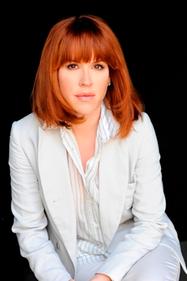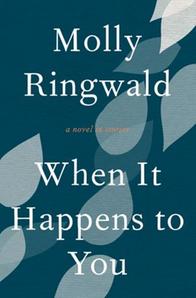 When It Happens to You (It Books, August 14, 2012) is a beautifully written debut novel-in-stories by Molly Ringwald. Yes, the same Molly Ringwald who starred in Sixteen Candles, The Breakfast Club and Pretty in Pink (to name only three of her many appearances on stage and screen), and now plays a lead role on the hit ABC Family show The Secret Life of the American Teenager.
When It Happens to You (It Books, August 14, 2012) is a beautifully written debut novel-in-stories by Molly Ringwald. Yes, the same Molly Ringwald who starred in Sixteen Candles, The Breakfast Club and Pretty in Pink (to name only three of her many appearances on stage and screen), and now plays a lead role on the hit ABC Family show The Secret Life of the American Teenager.
Each of the well-crafted stories in When It Happens to You centers on one of an interconnected group of people living in Los Angeles. Ringwald's writing truly shines when she explores the emotions of her characters. With topics ranging from heartache over marital betrayal to disorientation from the loss of a spouse to the joy of building an unlikely friendship and the excitement over meeting someone you might be able to fall in love with, there is a lot of raw emotional material for this gifted storyteller to work with.
Although this is her first novel, it is not her first foray into writing. Ringwald is also the author of the self-help/memoir Getting the Pretty Back: Friendship, Family and Finding the Perfect Lipstick (It Books). She answered a few questions for us about her new book via e-mail.

My original idea was to write a collection of stories that were linked thematically: they would all explore betrayal of one kind or another. When I began, I thought that I would connect the characters in a more tangential way. But as I got further in, the lens through which I was seeing the characters began to focus and I realized that I wanted them to be connected in a more profound way and that is when the "novel" began to present itself.
Which was the first story you wrote, and where did the idea for it come from?
"The Harvest Moon" (which is the first story in the book) was also the first story that I wrote. In fact, every story in the book was written in the order that it was eventually published. I had the idea for the main couple, Phillip and Greta, struggling with a marital betrayal, but I wanted to write about that specific moment after a betrayal has happened, when it can be very clear to just about anyone around it, but very unclear to one of the people in it. Then of course, once the betrayal is exposed, everything changes. There was an actual Super Harvest Moon in 2010 and it seemed like the perfect framing device--this incredibly rare natural phenomenon that occurs only every 20 years or so. I figuratively put my characters in that car and drove.
Has your experience as an actress portraying characters influenced how you write about your characters?
My characters need to seem real and interesting and flawed, which is what I have always been most interested in playing as an actress. I also tend to write characters who speak and act in opposition to what they feel, which is another trait that I have always found interesting in character. And perhaps my ability to improvise has helped me with creating believable dialogue.
If your book were to be adapted to film, which character would you most want to play and why?
I do hope to adapt the book into a film, and the only two women I could conceivably play are Greta and Marina. Of the two, I see myself more as a Marina, the mother in "My Olivia," and not just because she's a redhead! There is something very earthy and strong about her, and I see Greta as someone who is more of a mystery. She is intelligent, but spends so much of the book somewhat detached and aloof. But I think that the more you get to know her, the deeper she goes. I would love to find an actress who can embody all of these qualities. I think who I am basically looking for is a young American Liv Ullman!
Betrayal in close relationships features prominently throughout the book. Did you find it difficult to write about such an emotional topic?
It was definitely intense and draining at times, since I tend to act out the scenes as I write them. But I don't feel that emotionally charged topics are necessarily any more difficult to write than other subjects. If anything, the emotion can aid, in that it gives you something strong to latch on to and drive the writing forward. What is more difficult to me is if I feel disconnected from the story or characters for any reason (which obviously can happen during the writing process). When I reconnect and feel the emotions that my characters are experiencing, I am far too relieved to find it difficult!
How do you stay inspired throughout the writing process?
I just never stop thinking about the characters. I take notes constantly--though I use maybe a 10th of them; still, just the act of taking them sharpens my ability to observe and reminds me that there are these characters who need to be looked after. Luckily, I managed to create a cast of characters that I cared about so I was inspired to spend time with them and to help them figure out the mess they made of their lives. The book is all finished, but I do still find myself wondering where the characters are now and hoping that they are okay.
You've written both nonfiction and fiction. Which do you prefer as a writer? Which do you prefer as a reader?
At this point, I prefer writing fiction. I enjoyed writing memoir as well, but I find writing fiction much more liberating and, again, I think it goes back to my training as an actress. I feel very comfortable surrounded by the puzzles of individuals' psyches. It is also where I feel the most alive as I attempt to understand and then to explain to a reader. --Melissa Solberg, sales director, Shelf Awareness
photo: Fergus Greer

